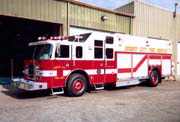The Jersey City Fire Department is switching gears on its equipment-purchasing policy. In his State of the City address two weeks ago, Mayor Glen Cunningham announced plans to lease, rather than buy, fire trucks in an effort to bring the city’s fleet up to date. The department has begun to implement leasing plans and will accept bids from manufactures in August.
"Normally you buy new equipment for the fire department out of the capital budget," explained Jersey City Fire Department Equipment Officer William Peters last week. "You budget for X amount and everyone tries to get their piece of the pie."
The Fire Department currently runs on a $51 million budget, which makes up part of the city’s overall $348 million budget.
According to Peters, it had been past policy of the city to purchase two to three new vehicles per year.
"Mostly the department buys pumpers and ladder trucks," said Jersey City Fire Director Jerry Cala. "Also, we want to replace a platform vehicle. The department has two right now, one purchased in 1993 and another going back to 1983. We would like to replace the older one."
Oftentimes, the department has had to compete with the needs of other sections of municipal government such as parks and road maintenance, Peters explained, adding the fire department became a "stepchild" in the budgetary process.
"The fire department trucks gained in age to the point where maintenance became a problem," Peters said.
After aging, the second problem facing the fire department fleet is maintenance, Peters said. Peters said that there is only one mechanic who does work on fire vehicles.
"Fifteen years ago, we had two mechanics who did work on the engines, a mechanics helper who was essentially an apprentice, and two guys who did preventative maintenance like checking oil and fixing lights," said Peters. "The other mechanics may know everything there is to know about the brakes on a police car, but they might not know everything about fire trucks."
Cala estimated the cost of leasing six fire fighting vehicles to be $300,000 yearly, adding the funds for the equipment would come out of the department’s operating budget instead of the city’s capital budget. The average cost to purchase a ladder truck, Cala added, is $600,000 while an engine would go for $300,000.
"Leasing would save the city $2 million in the capital budget this year," Cala stated. "Part of the money for the leasing would be generated by fines and fees collected by the city’s Fire Prevention Bureau."
Peters said the initial leasing plan would include four pump trucks, one ladder truck and one arial platform truck, also known as "cherry-pickers." The bidding process would likely begin August 1.
According to Cala, the fire department will solicit bids from manufacturers, with the contract going to the lowest bidder. Afterward the contract would be forwarded to city council for approval.
Comparing the process to leasing a car, Peters stated the city had the option to either return the equipment to the manufacturer after lease expiration or renew for another five years at the cost of $1.
"The plus side of leasing is that during the first five years, the trucks are under warranty for maintenance including oil changes and preventative work," Peters said. ‘The second five years are on us."
"Maintenance is the real point of leasing, we would save by not having to do that work," Cala said.
The only downside to leasing Peters could see would be in the future budgeting process.
"If we have a lease for the equipment, it will have to be paid no matter what," explained Peters. "Money would have to come out other portions of the budget to pay for the equipment. I’m all for leasing as long as the funding is there to do it."
"After leasing this year, the department might look into purchasing one vehicle annually," Cala said, adding leasing was still a possibility for future equipment acquisition.
As to the fate of the trucks taken out of service, Peters said the market for used fire equipment was very limited.
"Our trucks are run until the wheels fall off, our rigs get the hell beat out of them," Peters stated. "Not many people are interested in older trucks so they get sold for scrap."
So for now the department is waiting for the bids to come in, but Peters is largely optimistic about the leasing process. "Leasing the equipment was approved by the Department of Community Affairs," Peters said. "Everyone wants to be proactive about the process."
